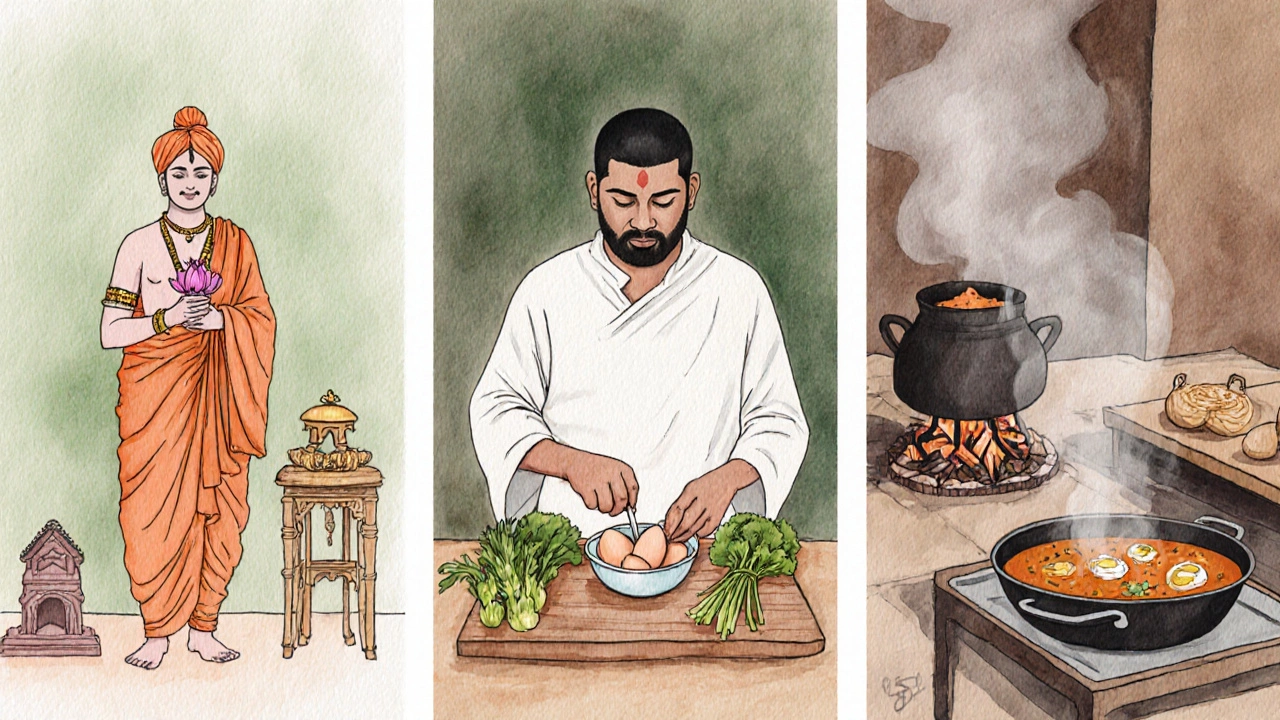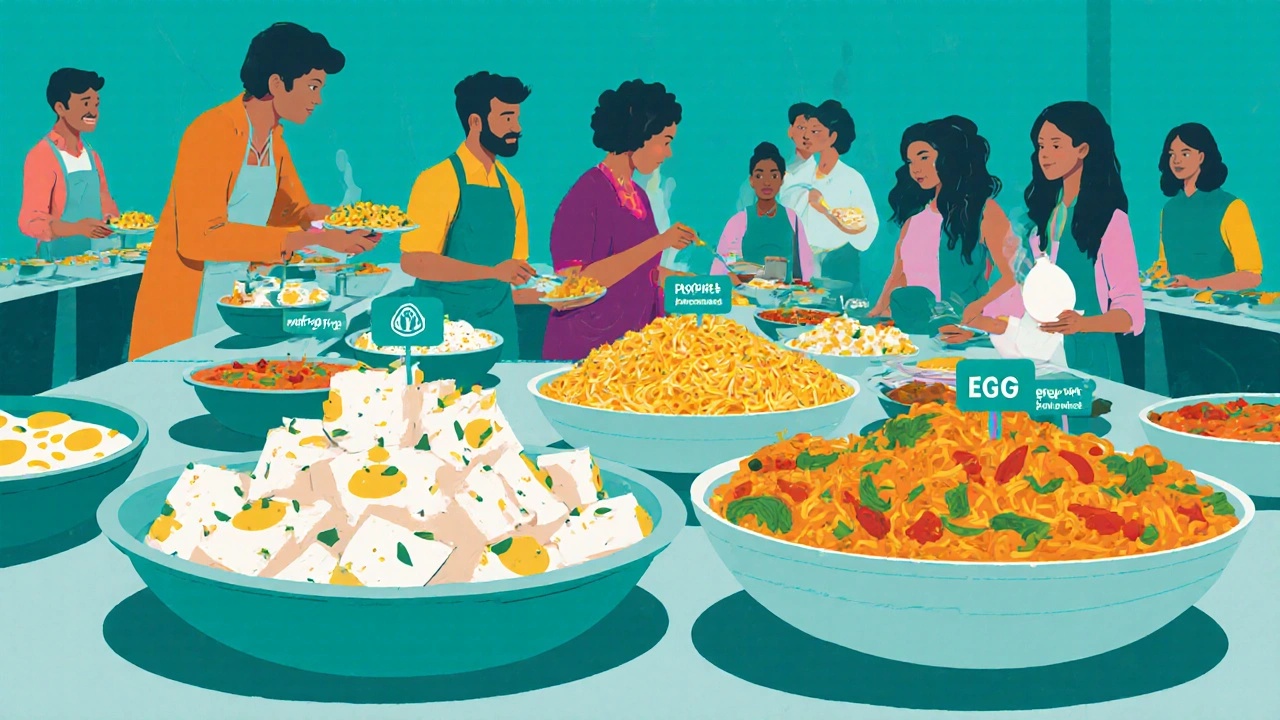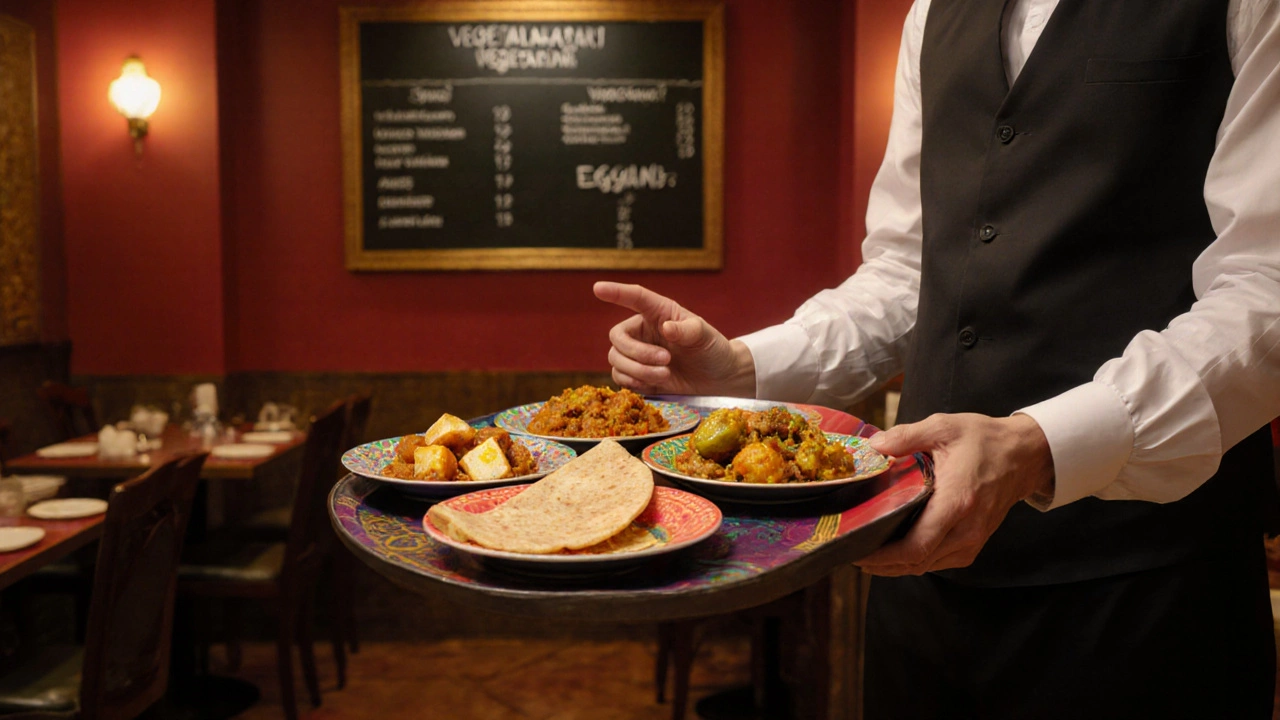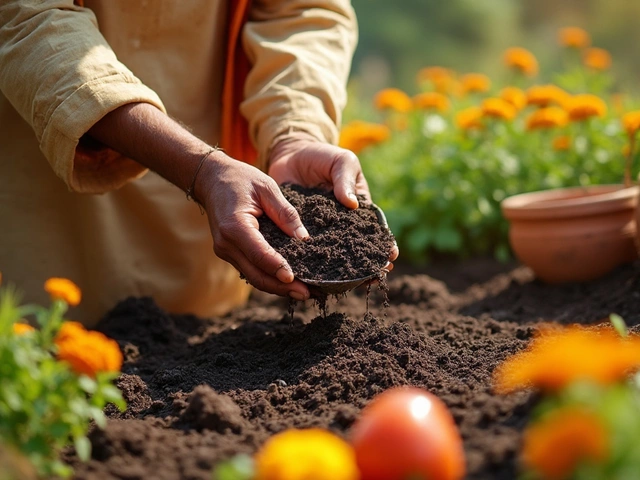Indian Vegetarian Dish Checker
Check if an Indian dish is vegetarian
This tool checks if a dish is typically considered vegetarian in Indian culture based on religious and regional guidelines.
Result
Ever stared at a menu, saw the word "vegetarian" and wondered if that includes eggs, especially when the dish is Indian? You’re not alone. Indian eating habits are a patchwork of religions, regional customs, and personal choices, and the answer isn’t a simple yes or no. Below we break down what vegetarianism really means in India, why eggs stir debate, and how you can navigate the maze whether you’re cooking at home or ordering out.
Key Takeaways
- Most Indian vegetarians avoid eggs; they are considered non‑vegetarian in Hindu, Jain, and Sikh traditions.
- Some people identify as "ovo‑vegetarians" or "egg‑loving vegetarians," but they form a tiny minority.
- Religious doctrines, especially Jainism and certain Hindu sects, define vegetarianism as "no animal flesh or eggs."
- Regional cuisines may offer "vegetarian" dishes that contain eggs when prepared for non‑vegetarian diners.
- When catering, always confirm the guest’s specific definition of vegetarian to avoid surprises.
What "Vegetarian" Means in India
Indian vegetarianism is a cultural and religious classification rather than a strict nutritional label. It typically means no meat, fish, or poultry, and for the majority of Hindu and Jain followers, it also excludes eggs. The term "vegetarian" on Indian restaurant menus usually follows this traditional rule, though some modern eateries label egg‑based dishes as "vegetarian" for convenience.
The word "vegetarian" in the West often focuses on plant‑based foods, but in India the definition is rooted in the concept of ahimsa (non‑violence). If a food item is believed to involve the death of an animal, it’s off‑limits. Since a fertilized egg is considered potential life, many treat it the same as meat.
Egg’s Place in Religious Traditions
Hinduism is the largest religion in India, and its many sects have varying views. Most mainstream Hindu groups, especially those following Vaishnava or Shaiva traditions, avoid eggs. They cite scriptures that categorize eggs with meat‑derived foods.
Jainism takes the strictest stance. Jains follow a diet that avoids any form of life, including the tiniest organisms, so eggs are unequivocally non‑vegetarian.
Sikhism traditionally permits eggs, but many Sikh families adopt a vegetarian kitchen out of respect for communal meals (langar). In practice, you’ll find both egg‑free and egg‑including dishes in Sikh cuisine.
Muslim, Christian, and Parsi communities in India generally consider eggs vegetarian, but they are not labeled as such on menus because the broader cultural expectation ties "vegetarian" to the Hindu/Jain definition.

Types of Indian Vegetarianism
When you hear "vegetarian" in an Indian context, it most often refers to the lacto‑vegetarian model. Below is a quick comparison of the main categories you might encounter.
| Category | Egg Included? | Typical Foods | Religious Prevalence |
|---|---|---|---|
| Lacto‑vegetarian | No | Paneer, ghee, dairy‑based sweets | Hindu majority, Jain majority |
| Ovo‑vegetarian | Yes | Egg curries, egg bhurji, boiled eggs | Minority (urban, health‑focused) |
| Vegan | No | Tofu, soy milk, almond‑based sweets | Growing among young professionals |
| Semi‑vegetarian | Sometimes (depends on family) | Fish in coastal regions, occasional egg dishes | Coastal states, certain tribal groups |
Notice how the vast majority of Indian vegetarians fall into the lacto‑vegetarian bucket, where eggs are a definite no‑go.
Common Dishes and How Eggs Fit In
Even if a dish is called "vegetarian" on a menu, it might still feature eggs when the kitchen assumes the patron is non‑vegetarian. Here are a few examples to watch out for:
- Egg Curry (Anda Curry) - A spicy, tomato‑based gravy with boiled eggs. Served mostly at non‑vegetarian tables.
- Egg Bhurji (Spicy Scrambled Eggs) - Often listed simply as "bhurji" without specifying "egg"; vegetarians may skip it.
- Masala Dosa with Egg - South Indian crepes that can be filled with a thin egg layer. Many restaurants offer an "egg‑masala dosa" as a separate item.
- Paneer Tikka - Purely vegetarian; a safe bet for lacto‑vegetarians.
- Chole (Chickpea Curry) - Whole‑heartedly vegetarian and widely loved.
If you’re ordering for a strict vegetarian, ask the server whether the dish contains eggs. The phrase "egg‑free" or "no egg" is becoming more common in metro city menus.
Practical Tips for Cooking or Catering to Indian Vegetarians
- Ask Directly. Instead of assuming, say, "Do you eat eggs?" It’s respectful and clears confusion.
- Read Labels. Packaged foods often label "contains egg" even when marketed as vegetarian.
- Use Separate Utensils. In many Indian homes, a separate cutting board or oil is used for egg dishes.
- Offer Alternatives. Replace egg in omelette‑style dishes with paneer or tofu. A tofu scramble works well in place of egg bhurji.
- Know Regional Variations. In Gujarat and Rajasthan, vegetarianism is almost universal; in Kerala and coastal Karnataka, many families include eggs in their daily meals.
- Label Your Dishes. If you’re hosting a buffet, clearly mark "egg‑free" options.
Following these pointers ensures no one feels left out or embarrassed over food choices.

Frequently Asked Questions
Frequently Asked Questions
Are all Indian vegetarians also egg‑free?
The overwhelming majority avoid eggs, especially those following Hindu or Jain traditions. A small, growing segment-often urban health‑conscious diners-identify as ovo‑vegetarians and do eat eggs.
Why do some Indian restaurants label egg dishes as vegetarian?
In bustling city eateries, the term "vegetarian" is sometimes used loosely to attract a broader crowd. They may add a note like "vegetarian (egg‑free)" or simply assume the customer knows the cultural nuance. Always double‑check the menu description.
Can I substitute eggs with a plant‑based alternative in Indian recipes?
Yes. Crumbled tofu, chickpea flour batter (besan), or soy‑based scramble work well in dishes like bhurji or omelette‑style curdles. They absorb spices similarly and keep the texture light.
Do Indian festivals have special rules about eggs?
During festivals like Navratri or Shivaratri, many observant Hindus adopt a strict lacto‑vegetarian diet, completely avoiding eggs for the entire fasting period.
Is the term "egg‑vegetarian" used in India?
It’s uncommon. People who eat eggs but no meat usually describe themselves as "non‑veg" or simply state "I eat eggs." The phrase "ovo‑vegetarian" is mostly found in academic or health‑food circles.
Next Steps
If you’re planning a menu for a mixed Indian crowd, start by listing all egg‑free dishes-think paneer tikka, dal makhani, aloo gobi, and vegetable biryani. Then, add a separate section for egg‑based items and label them clearly. When in doubt, ask your guests about their specific dietary preferences; a quick "Do you eat eggs?" can save a lot of awkwardness later.
Understanding the cultural backdrop of the Indian vegetarian diet not only respects tradition but also enriches your culinary experience. Whether you’re cooking at home, ordering takeout, or hosting a dinner party, the key is clear communication and thoughtful ingredient choices.





